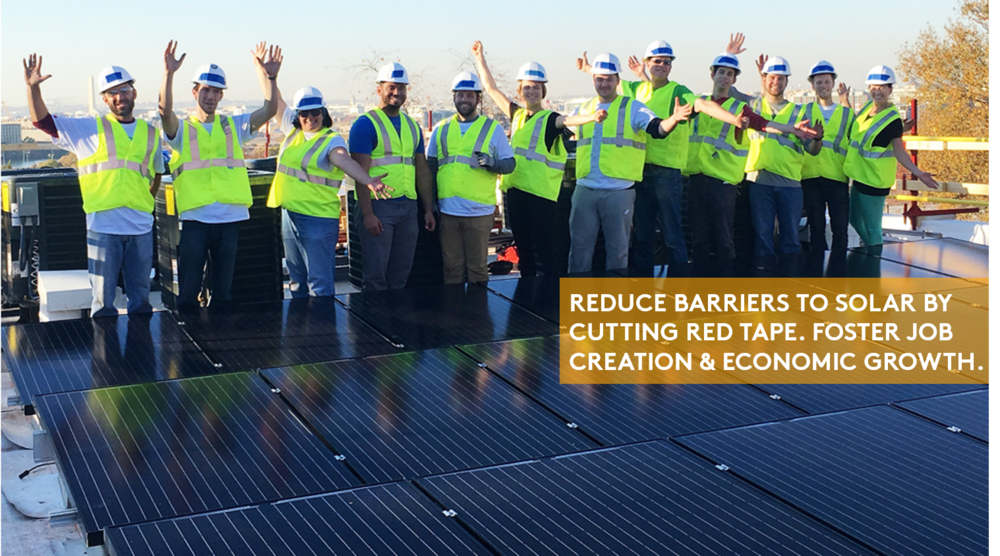
By Ross Pumfrey, energy and organizational consultant; and Chad Laurent, vice-president of Meister Consultants Group
In spite of falling prices and record U.S. solar installations in 2016, the rate of solar adoption on residential and commercial properties varies greatly among local communities. One of the reasons for slower adoption, not surprisingly, is that higher non-hardware costs (known as “soft costs”) can make the economic justification for solar more difficult. An important determinant of those costs can be local policies and processes.
The U.S. Department of Energy has recognized the issue of soft costs and has used its SunShot Initiative to support both research and creative programs for several years. One such program is SolSmart, which aims to help local governments to reduce costs, create local solar jobs, and become more “solar friendly.”
SolSmart offers no-cost technical assistance and national recognition to cities, towns, and counties that wish to improve policies in support of citizens’ demands for solar energy while simultaneously creating local jobs. Current funding for SolSmart, which launched in spring 2016, extends through the fall of 2018.
This article summarizes how the SolSmart program operates and the levels of participation thus far attained both nationally and in Texas. We encourage readers whose local government is not yet involved to educate their officeholders on this program.
How SolSmart Works
Unnecessarily burdensome local rules and regulations often complicate, delay, or discourage solar adoption. SolSmart seeks to reduce many of the soft costs of installing a solar photovoltaic system by eliminating bottlenecks and simplifying business and administrative processes. The program’s quiver of options for making these improvements relate to permitting, financing, and utility interconnection, among others. Cutting unnecessary red tape, streamlining, and rationalizing the process reduces costs and opens up economic opportunities for the community.
Research has indicated that improved local policies do indeed result in lower system costs, and a decade of experience has led to the development of “best practices” for addressing the relevant issues. However, many local governments have not learned or applied these lessons to make solar installations easier and less expensive.
A couple of examples illustrate where improved processes or policies could help. First, the amount of time it takes a local jurisdiction to issue a permit affects the number of calls the installer must make to stay on top of the process, which in turn affects both customer satisfaction and labor costs. The most efficient jurisdictions can issue the permit in three days or less.
A second example is in the category of building codes. SolSmart encourages consideration of the concept of “solar-ready” buildings. Relevant codes would include a requirement that during the design and construction of a building, south- and west-facing roofs remain free of obstructions such as vent pipes, and provide enough roof space to take maximum advantage of solar energy. Additionally, requirement of an inexpensive, pre-installed conduit from the electrical panel to the roof can save hours of labor when the owner eventually installs solar. These are cases of smart planning that would invigorate the local economy, since more and more property owners will choose solar in coming years.
SolSmart provides no-cost technical assistance to local governments to improve policies and processes via an impressive team of experts from around the country. The lead organization is The Solar Foundation, and the team includes staff from the National Renewable Energy Laboratory, Meister Consultants Group, National League of Cities, National Association of Counties, Solar Energy Industries Association, Electric Power Research Institute, Regulatory Assistance Project, Brooks Engineering, and other small groups and individuals that support the program.
The technical assistance is provided through webinars, one-on-one telephone consultations, and regional workshops. In some cases a special SolSmart Advisor works on site with local officials for several months.
Who Benefits?
The program leads to lower costs for business owners and homeowners, and increased business for solar installers and their employees. The local community also gains national recognition for its stewardship in creating a more vibrant and sustainable economy. Depending on the number of points earned from the adoption of improved policies in categories such as permitting and planning, zoning, and development regulations, participants can achieve Bronze, Silver, or Gold status.
The International City/County Management Association (ICMA) oversees the designation process, with collaboration from the National Civic League, Home Innovation Research Labs, Meister Consultants Group, and The Solar Foundation.
The executive director of ICMA, Robert J. O’Neill, Jr., stated, “The role of local governments in building stronger and more resilient communities has never been greater. Cities, towns, and counties consume a large portion of the nation’s electricity, which is why they can also have a significant influence on the financial, environmental, and economic health of the country by adopting solar energy technologies. The SolSmart program will recognize that impact.”
Participants can obtain technical assistance before attaining Bronze status, or after earning either Bronze or Silver status — as long as they demonstrate a commitment to improve the local business climate for solar energy.
National Participation
As of early March 2017, the program has served a population of more than 21 million people, designating 36 cities and counties in 18 states, including 3 Texas cities. Of the 36, 15 have been awarded Bronze status; 3, Silver status; and 18, Gold.
A total of 168 jurisdictions are seeking designation and have availed themselves of some form of the available technical assistance. The first round of assignments for SolSmart Advisors (who provide the more extended, on-site assistance) has recently been scheduled, and 11 communities around the country will host these experienced professionals in the coming months. The second round of Advisor applications also just wrapped up and 14 additional Advisors will be deployed this summer.
Texas SolSmart Jurisdictions
 So far, 14 cities in Texas have become involved with SolSmart. Two of them, Brownsville and Plano, were designated in the spring of 2016 as “Early Adopters” in the program — they were among the first 28 local governments in the country to join and were the first to apply to receive technical assistance.
So far, 14 cities in Texas have become involved with SolSmart. Two of them, Brownsville and Plano, were designated in the spring of 2016 as “Early Adopters” in the program — they were among the first 28 local governments in the country to join and were the first to apply to receive technical assistance.
Since that first stage, Plano has gone on to qualify for Bronze status. Last fall, Austin became the first city in Texas to be designated Gold.
Ten Texas jurisdictions have applied for designation (including Brownsville, Plano, and Austin) and are receiving technical assistance. The other seven are Cedar Hill, Denton, Stafford, Kennedale, Lewisville, El Paso, and San Antonio. El Paso and San Antonio are close to receiving designation. In addition, four additional jurisdictions — Houston, Silverton, Port Arthur, and Laguna Vista — have expressed interest, but have not yet submitted an application for technical assistance or designation.
Finally, 22 communities in the region covered by the North Central Texas Council of Governments (NCTCOG) have expressed initial interest in designation and are hoping to leverage the work of NCTCOG’s Go Solar Texas project.
What You Can Do
If your city or county is not among the ten that have applied for designation (listed above), consider contacting your elected officials about SolSmart, and bringing like-minded allies to that effort.
If you would like to discuss possible strategies for this endeavor, contact TXSES at ross@txses.net.
Ross Pumfrey is a consultant for TXSES and was recently chair of the board of directors. He has extensive experience in renewable energy, including serving during the 1990s as director of renewable energy programs for the U.S. Agency for International Development.
Chad Laurent is Vice President and General Counsel at Meister Consultants Group, Inc. He is a nationally recognized expert in helping create renewable energy opportunities in local communities, and is currently working with the US Department of Energy providing technical and outreach consulting for the SunShot Initiative SolSmart designation program.
